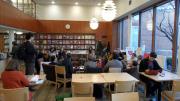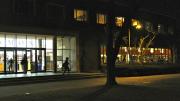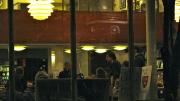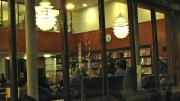Library staff protests against the possibility of widespread layoffs as part of a reorganization of the Harvard Library took a new turn Sunday night, as Harvard student members of the Occupy movement took over Lamont Library Café, announcing their intention to stay until the 24-hour library’s regular Friday night closing at 10 p.m. this week. On Monday morning, a core group of seven or eight occupiers, mainly doctoral candidates, maintained a quiet (and studious) vigil, surrounded by posters with messages such as “YOU CAN’T EVICT AN IDEA,” “ANOTHER WORLD IS POSSIBLE” and “NO CUTS.” They distributed copies of a flyer explaining the purpose of their occupation with a schedule of events on the obverse side.
A “general assembly,” at which library workers were expected, was scheduled for 6 p.m. Monday evening, as rumors circulated among staff that an early retirement incentive for library workers would be announced this week. But as one library staffer conferring with the protestors complained, the library workers who took an early retirement package during earlier cuts associated with the financial crisis are already under stress as the retiree share of healthcare costs rises.
The library occupiers are some of the same students who occupied Harvard Yard during the fall, joined now by Harvard students formerly involved in the Occupy Boston movement.
Update: Shortly after 11 a.m. Monday, the Lamont Occupiers were informed by a library administrator that their signs—which they regard as protected speech—violated what a library operations manager described as an "unwritten policy" against attaching signs to library buildings. The students argued that their signs were protected under the University's written policy protecting free speech, as can be seen in a video of the incident on the Occupy Harvard website. Members of the Harvard University Police department then removed the signs at the direction of the library manager over the protests of the Occupiers.
Monday evening, the protestors were given a written reminder of the library's rules and regulations, and informed that their library privileges would be suspended if they broke any of them. They were also told—this was not written down—that they could not use sleeping mats or sleeping bags.














